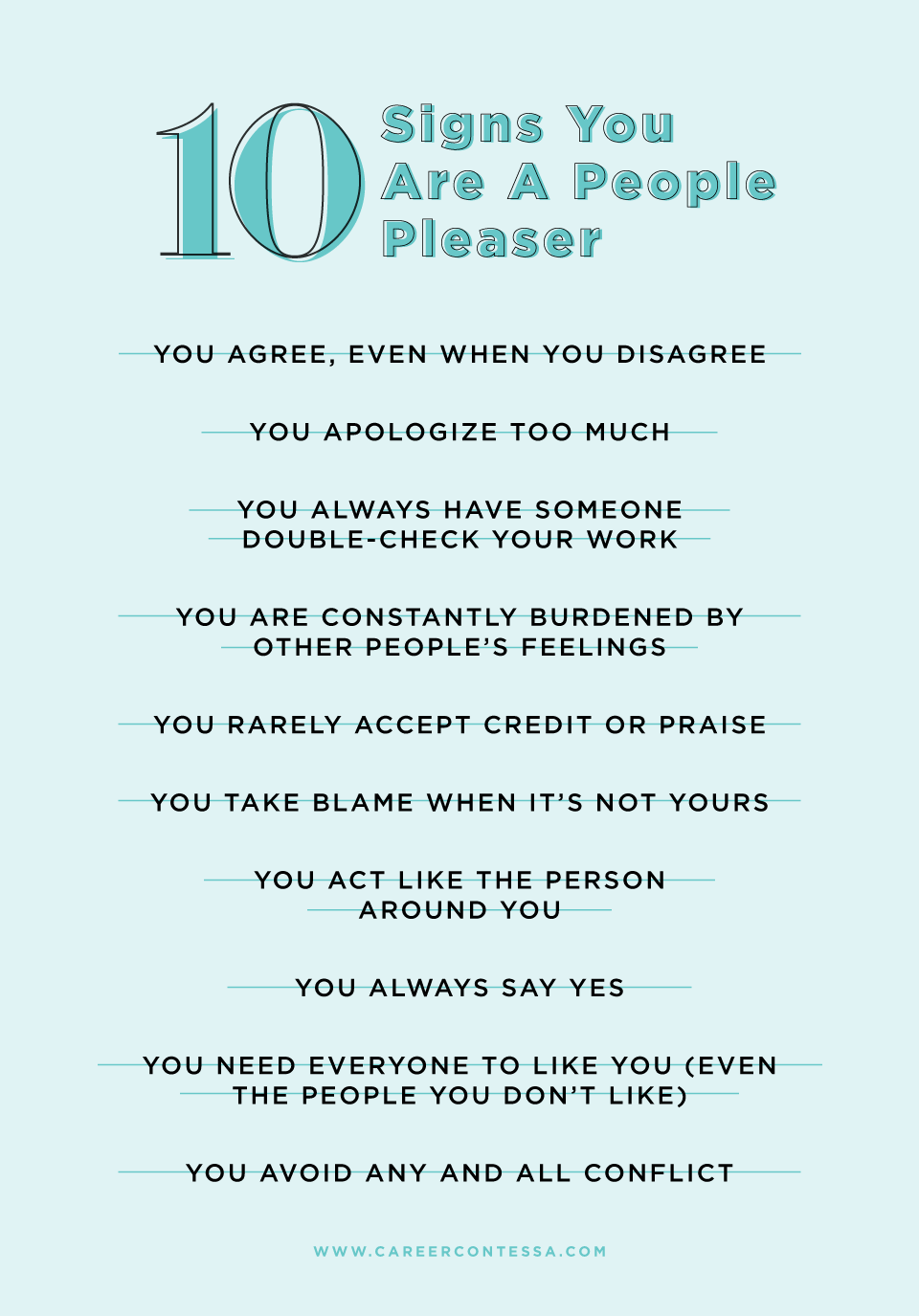Not to be rude, but you might be a people pleaser, but it's ok if you are. It's ok, I'm sorry!
People-pleasing can be tough to unlearn, especially because it usually comes from a good place!
People pleasers are generally well-liked, especially in the workplace, where they are seen as a helpful team player. But when do you cross the line between a "nice person" and a "people-pleasing doormat?"
Medical News Today contributor Zawn Villines distinguishes "nice behavior" from "toxic people pleasing" in one's inability to curb their behavior, sharing, "What distinguishes [kind] behaviors from people-pleasing is that the latter is difficult to stop. A person with a strong urge to please may feel they need to be whatever others want them to be. They may cover up how they really feel or agree to too many favors."
Table of Contents
While it's a great set of skills to be able to work with others (hello,
interpersonal skills!), being too much of a people pleaser actually sets you back. It diminishes your work, undermines your authority, and—eventually—stunts your professional growth.
That's not all, either. When you become entrenched in people-pleasing, it can take a toll on your mental health. When you put others' needs ahead of your own needs at all times, you make room for
anxiety, resentment, and self-neglect.
What Is a People Pleaser?
Simply put, people pleasers want to please others and feel well-liked by everyone.
People-pleasing is a coping mechanism where your care for others harms your own work, all in the name of meaningless external validation and acceptance.
People-pleasers tend to drop what they are doing—no matter what—to help. But that's not all; they often need their level of assistance validated by an outside party.
Examples of People Pleaser Behaviors
Where Do People-Pleasers Come From?
People-pleasing often comes from a place of low self-esteem, low self-worth, fear of rejection, or
lapses in confidence. These all feed into negative emotions—especially in the workplace (and even more so in a new job!)—that make it feel like you're constantly risking disappointing others. Let's break down these causes a bit more:
- Insecurity: People-pleasers worry about what others think of them and they think if they can go above and beyond to please a person, they will be liked.
- Low Self-Esteem: Thanks to a lack of self-confidence, people-pleasers often work to get external validation. They want to feel accepted and "good enough" in the eyes of others in order to feel good about themselves.
- Perfectionism: People-pleasers also have a need for control and for things to feel "perfect," so they will work to make the situation just right.
- Fear of Rejection: People-pleasers want to be liked by everyone, and if they aren't, they worry they will be rejected or shunned.
10 Signs You're a People-Pleaser at Work
Here are ten signs that your people-pleasing might be getting out of hand. This kind of pleaser behavior almost always leads to burnout or much worse. Let's find a way to replace it with healthier behavior—all while keeping your kindness intact.
- You Agree, Even When You Disagree
- You Apologize Too Much
- You Always Have Someone Double-Check Your Work
- You Are Constantly Burdened By Other People's Feelings
- You Rarely Accept Credit or Praise
- You Take Blame When It's Not Yours
- You Act Like the People Around You
- You Always Say Yes
- You Need Everyone to Like You (Even the People You Don't Like)
- You Avoid Any and All Conflict
Now, let's understand why each of these people-pleasing behaviors might undo your work progress.
1. You Agree, Even When You Disagree
This is a common trait of people pleasers. It can be as seemingly innocent as pretending to have hobbies that you actually don't care about—like when you "bond" with your boss about their fishing trip, but you know nothing about angling. (Yes, I did have to scour my brain to dig out "angling.")
Whether in a meeting, having a one-on-one conversation, or in the middle of
a big negotiation, people pleasers tend to agree—even when they don't. There are certain circumstances where sharing your personal or political opinions is not necessary. However, people pleasers tend to agree even when they vehemently disagree.
Depending on the scope, agreeing for the sake of others crosses lines of honesty and, sometimes, even your core values and morality.
This can cause a crisis of conscience, guilt, and frustration.
If you find yourself being agreeable for the sake of being agreeable, ask yourself a few questions:
- Does agreeing with this particular opinion/direction/move go against my personal values?
- Is agreeing with this undermining the work and research I have already done up to this point?
- Does agreeing to this do more harm or more good?
2. You Apologize Too Much
Apologies are fine when you're actually sorry—or when you have something legitimate to apologize for. But, again, ask yourself a question when you find yourself apologizing in most interactions. Are you undermining yourself by
constantly apologizing? We tend to use apologies to smooth over awkward events and to make room for others to be comfortable.
For example, you don't need to apologize when you speak up, when you disagree, when you cough, or when you bump into someone in the hallway.
3. You Always Have Someone Double-Check Your Work
People pleasers do this to get feedback and ensure their work is up to snuff. Like a lot of "pleaser" behavior, this isn't always a bad thing. Generally speaking, feedback is great, and we should seek it out where we can.
However, constantly
asking for feedback, approval, or credit can actually undermine your sense of self and the quality of your work—and it can diminish how others view you. Rather than constantly asking for feedback,
find new confidence in your work.
If you're looking for a second pair of eyes for edits or mistakes, create a checklist for yourself. Run your own work quality checks through a battery of filters. Is everything spelled correctly? Are the dates all correct?
Asking for help is good. However, you also need to
enlist self-confidence in your own work rather than relying on approval from your supervisor at every turn.
4. You Are Constantly Burdened by Other People's Feelings
Do you find yourself constantly distracted by your boss's moods? Do you feel personally attacked if your coworker wears her headphones for an entire day?
People pleasers commonly find themselves involved in other people's feelings. Think of it as an empathy overload.
Empathy is crucial in the workplace, but there is a line where empathy can actually manifest as nosiness in disguise.
Recognize when those around you are in need of a soothing word or a walk around the block. However, also recognize that when people need a few minutes of solitude or when they are having a personally bad day, they might want to be left alone—and it has nothing to do with you.
Know when your attention to other people's feelings is an intrusion on your work and your own well-being.
5. You Rarely Accept Credit or Praise
Raise your hand if you've ever shaken off praise by saying something like, "Well, the whole team helped, so..."
Accept your praise when it's due. Take a bath in it. Treat yourself to a nice lunch. It's that simple. Next time praise comes your way, recognize if you're about to explain it away. Instead, try a simple thank you. Enjoy the victory—you've earned it.
6. You Take Blame When It's Not Yours
Does confrontation make you uneasy? Does discord send your day into chaos? This behavior is a little extreme, but listen up. If you find yourself taking the blame for someone else's mistake—even in the interest of settling a dispute or calming things down—you are probably a people pleaser.
If you're not going to accept credit or praise for work well done, do not accept blame for missteps by others. While you feel like you are diffusing a situation in the moment, you are actually adding to long-term problems. When teams cannot find the root cause of a problem, it will likely reoccur and have bigger repercussions.
Next time there is unrest in a meeting or between members of your team, let the real problem come to light.
7. You Act Like the People Around You
Everyone has a little bit of a different personality for different environments. For example, when you're out for dinner on a Saturday night with your three closest girlfriends, your demeanor is going to be slightly different from your Monday morning vibes.
The language you use with your partner or your mom will be different than the language you use with your manager or a client. Everybody wears different hats throughout their entire lives. However, if you find yourself constantly shapeshifting at work, you might be a people pleaser.
This is not a matter of using professional language with one person and more casual parlance with another. This is when you find your views and outlooks changing when speaking to one person or another.
This type of behavior can have especially damaging consequences when you ally yourself with someone who is
unhappy or negative in the workplace. If you recognize this type of behavior in yourself, conduct an honest check-in. Are you doing and saying the things you really believe? Is this relationship capable of hurting your career in the long run?
8. You Always Say Yes
You might be a chronic people-pleaser if you often find yourself in the office, after hours, doing work that isn't technically yours. Once you become known as the office people pleaser, you will become a sitting duck—an easy target.
If you work with people—especially someone who is slightly senior to you—you might find work being passed on to you. One of our favorite problematic coworkers,
the work shirker, is sure to seek you out and overload you with work. Since you don't want to say no, you do it, again and again. Thus begins a vicious cycle.
Help out when you're needed. All hands on deck are necessary in any work environment at any given moment. However, if you start to notice that another coworker is constantly pushing work onto you
and leaving the office early, you need to put your foot down
with a firm NO.
9. You Need Everyone to Like You (Even the People You Don't Like)
When you walk into the office, do you say hello to everyone? Have you noticed that Karen from accounting never responds in kind? She never even sends a smile your way, which drives you up the wall. Why doesn't she like me?
But wait a second, you don't even really work with Karen in accounting. In fact, whenever you have accounting needs, you work with Sheila. Come to think of it, you don't even really like Karen to begin with!
Here's the thing. It's great to get along with everyone in the workplace, but maybe you aren't Karen's cup of tea—and vice-versa. As long as it doesn't affect the quality of your work—or Karen's work—who cares?
10. You Avoid Any and All Conflict
Are people raising their voices in the conference room? Is your coworker getting reamed for something you know is not her fault? What do you do?
People pleasers tend to avoid any and all conflict. Nobody really loves conflict, but when you're actively avoiding conflict, it can do more harm than good. The next time there is conflict, consider whether you have information or a point of view that could lead to a resolution instead of sticking to the sidelines.
In short, avoiding conflict is not always good—especially when you might hold the key to a solution.
The Effects of Being a People-Pleaser
If you struggle with a ton of people-pleasing behavior, you might want to work on building the mental strength to let go of it. Not to be a broken record here, but a lot of people-pleasing behavior comes from an intrinsically good place. However, over time, it can damage your professional and personal relationships.
Here are some other effects of being a people-pleaser:
- Frustration: It's easy to get into a cycle where you say "yes" to helping someone, which takes you away from your own needs, and you're left angry and taken advantage of. People pleasers often feel obligated to help, but then regret it after.
- Anxiety: When you're trying to do it all and make all the people around you happy—except for yourself—it can leave you with a burden of physical and mental overwhelm. This can quickly cause you to feel stressed and anxious about how you'll get it all done.
- Burnout: With prolonged periods of people-pleasing, eventually, you will encounter complete burnout. Physically, mentally, emotionally, and even financially burned out from helping others can lead to serious health issues.
- Resentment: When you're reluctantly doing things for other people over and over again, you can start to resent them easily. That resentment will often grow into unhealthy behaviors.
- Disengaged: When you're so busy worried about what others think of you or helping them, you have little time to pursue your passions and goals. It's easy to become disengaged with your own wants and needs.
- Inauthentic: How can you truly know what makes you happy when you're so busy worried about other people's needs?! When your passions and interests are based on what other people like, it's easy to feel like you don't know yourself at all.
How to Stop Being a People-Pleaser
If you identify with being a people-pleaser, you're probably wondering how to kick the habit while retaining the kindness and empathy that makes you so special. Fortunately, there are some things you can do to balance your desire to be well-liked and create your own healthy boundaries.
1. Establish Healthy Boundaries
Set clear
boundaries by spending time to understand your limits. When are you pushed over the edge? Take time to track those for a few weeks, and then find ways to communicate those boundaries clearly and consistently.
When someone asks you to take on something that you know will be too much, pause, and then let them know it's beyond the bounds of what you can help with right now.
Another helpful way to set and enforce boundaries is to communicate them upfront. We love to use our email signature to let people know our working hours and average response times. Decide your own preferences based on what works for you—and then let people know before issues arise. Toxic people will always try to push your limits, but holding your ground teaches them you can't be pushed.
2. Set Your Own Goals and Priorities
Being too busy to take care of your own needs will lead to a feeling of resentment. The same is true when you're not able to work toward
your own personal goals. When you're too busy helping someone else reach theirs, what happens to your career and life goals in the long term?
Instead, take time to reflect on where you want to spend your time and where you want to direct your goals. Being clear about what your priorities are can help you decide what is worth your time and energy.
3. Focus on Progress
When you're so focused on the approval of others, the target is always moving. Now that you're working to replace the needs of others with your own, you'll also want to set healthy expectations. Behavior change takes time. Accept that you will need to start small and celebrate your progress over perfection.
4. Create Positive Routines
Your lack of self-esteem and negative feelings need to be replaced with more positive habits. Some things you can try are replacing your
negative self-talk with positive self-talk, creating a
mantra that reminds you of your worthiness, and other self-care practices that set you up for success in your day.
5. Pause Before You Say Yes to Things
The old you would say yes and then have regret later. But we're changing that around. When someone asks you to do something, create a new habit of saying, "Let me check my calendar and get back to you," or some quick response that allows you to answer but not make any commitments.
Once you've had time to review that their request aligns with your own goals and priorities, you can give your real answer.
6. Filter Requests Through Your Priorities
You only have so much time, energy, and mental resources. Don't waste time in
decision fatigue stasis. Make
decision-making easier and faster by creating a quick way to filter through if something is worth your time or not. We recommend keeping a visual list that has your goals and priorities written down. That will help remind you quickly.
7. Get Comfortable With Saying No
Queue up the "
Nobody But Me" by The Human Beinz and practice saying, "No."
You might fear the disapproval of someone else when you
tell them no, but what happens when you say yes and then immediately regret it? The disappointment with yourself will be harder, and you'll likely spend more time backtracking to tell the person no later.
We've learned from experience that it's easier to say no one time upfront than it is to go back and forth with trying to cancel later.












